To mark International Women’s Day 2022 on Tuesday 8 March, FISH magazine highlights some of the organisations and women helping to shape the future of Australia’s fishing and seafood sector
Women in Australia’s seafood sector will have new opportunities in the year ahead to develop their skills and strengthen their voice through Women in Seafood Australasia (WISA).
For more than 20 years, volunteers have worked hard to make WISA the national voice for women in the Australian seafood sector. In November 2021, WISA started on the path to being a company limited by guarantee after its new constitution was passed at its annual general meeting.
As a registered not-for-profit company, WISA will be better able to respond to members and their needs, be a stronger voice for women and be able to run a charity arm of the organisation.
New leadership at WISA
WISA has also had a change in leadership. After three years of steering WISA through instrumental changes and the renewal process, president Karen Holder has passed the role to Heidi Mumme, who was vice president.
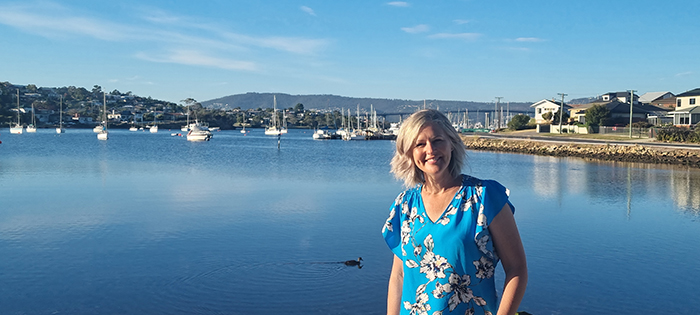
Mumme has been a member of the WISA board since 2017 as a director for both the Northern Territory and Tasmania.
“Karen’s passion, commitment and dedication to WISA and the industry has seen the organisation go from strength to strength, leaving us with an amazing legacy to build upon,” says Mumme.
“I’ve been involved in fisheries and aquaculture for over 20 years and I’m passionate about women in the seafood industry having a voice and empowering them to reach their full potential.
“WISA is in a fantastic position to enhance the skills of seafood women and develop effective partnerships with stakeholders to raise the profile of women in the seafood industry. As WISA moves to its new structure, we are looking to expand our membership and create opportunities for new board members to help guide WISA through its next phase,” she says.
WISA has also recruited its inaugural executive officer, Kirsten Abernethy. She is a social scientist who has worked with wildcatch fisheries and fishing communities for more than 10 years as a researcher, teacher and advocate.
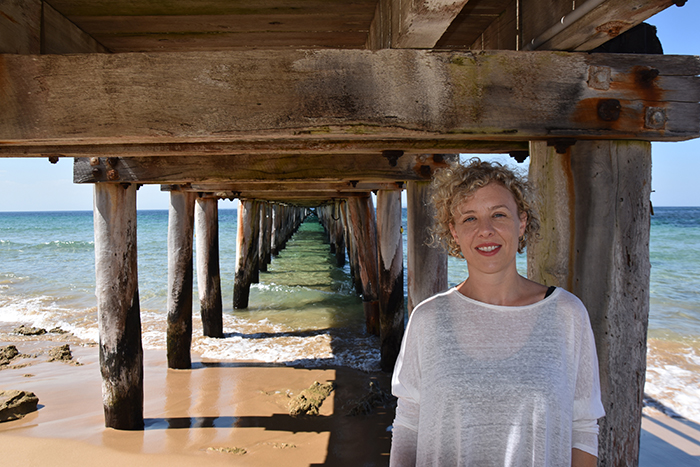
“I’ve worked internationally and in Australia with my own consultancy business, while at the same time working in my family’s fishing business,” Abernethy says.
“I’m passionate about industry stories and seafood communities. I’ve focused my work on health and wellbeing, particularly mental health, and building community knowledge, trust and support for the industry. But first and foremost, I’m an optimistic advocate for women in the Australian seafood industry.
“One of my first tasks is to finalise an exciting webinar series focusing on leadership and women in the seafood industry, so keep an eye out for that,” says Abernethy.
WISA has several other exciting events and learning opportunities in the pipeline for 2022, including its popular Power Up Breakfast at Seafood Directions, which will be held in Brisbane from 13–15 September 2022.
To find out more about WISA, to become a member or attend a WISA event, please visit the WISA website www.womeninseafood.org.au, connect on social media, or email eo@womeninseafood.org.au or president@womeninseafood.org.au.
More information
Kirstin Abernethy eo@womeninseafood.org.au;
Heidi Mumme president@womeninseafood.org.au, www.womeninseafood.org.au.
Suzie McEnallay
Honouring family tradition
By Gio Braidotti
Established in 1947, the Wallis Lake Fishermen’s Co-operative in Tuncurry, New South Wales, is today headed by general manager Suzie McEnallay. The co-op is the voice of the local commercial fishers and forms the central receiving depot for daily catches of fresh fish, lobster, crabs, prawns and a variety of shellfish.

McEnallay says that a career in the seafood sector came naturally to her as fishing and the seafood sector are in her blood.
She grew up as a fourth-generation member of a fishing family. Her grandfather was one of the first shareholders when the co-op formed and her father, brother and husband are all fishers and co-op shareholders. In fact, many of the local fishers are the children, grandchildren and great-grandchildren of co-op founders.
“I grew up in the co-op and have a passion for the industry due to my family’s involvement,” she says. “This isn’t a job but something that is part of my heritage and my family’s future.”
Her role sees her take care of all aspects of the facility, including liaising with staff, fishers, suppliers and markets. It’s an operation that sells seafood locally and also distributes to markets in Sydney, where the brand is well known to buyers on the auction floor. The Wallis Lake operation runs seven days a week.
McEnallay worked her way up to the role of general manager, starting out as a shop assistant and learning the ropes as she progressed to shop manager, wholesale manager and then operations manager.
|
“This isn’t a job but something that is part of my heritage and my family’s future.” |
Included in the co-op’s operations are two trawling boats, three lobster fishing vessels, eight ocean trap and line boats, and about 35 estuary fishers.
“I have been lucky over the years to receive many opportunities for development, including participating in the National Seafood Industry Leadership Program,” she says. McEnallay has also travelled to the US to visit fishing ports and attend a seafood summit in Virginia.
She says she values these practical learning experiences as they allow her to better navigate a course forward, especially given the many changes she has seen take place within the sector over recent years.
“The biggest challenge was the NSW commercial fisheries reform in 2017 that saw many fishers leave the industry and it changed the way fishers fished,” she says. “That’s made us very proactive in ensuring the co-op’s success into the future and we have plans for growth and redevelopment.”
Her vision is strongly focused on helping fishers stay in the sector and making their job easier with better facilities and more efficient weigh-in processes. It is a duty of care that comes from the heart.
More information
Suzie McEnallay admin@wallislakefish.com.au
Website https://wallislakefishco-op.com.au
Video http://www.youtube.com/watch?v=TwXo1tKWq_A
Tarun Richards
Values that matter
By Gio Braidotti
Between Darwin and Kakadu National Parkin the Northern Territory lies a family-owned enterprise, Humpty Doo Barramundi, that achieves something truly special in the field of food security. It realises the dream of producing high-quality protein for a growing population without harm to the environment.
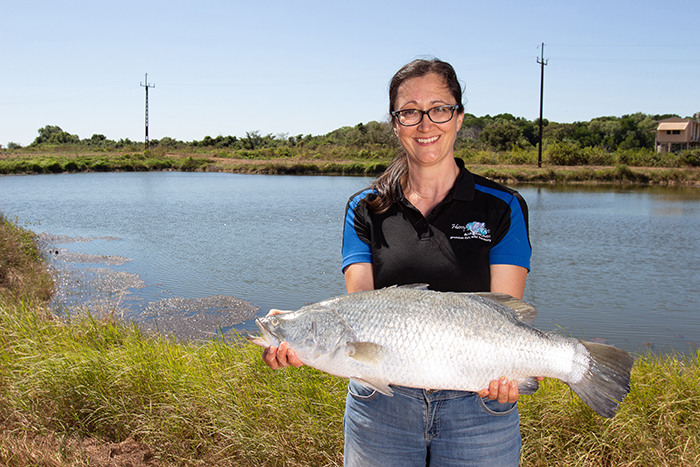
Humpty Doo Barramundi is an aquaculture facility that farms saltwater Barramundi (Lates calcarifer) alongside the Adelaide River using advanced, award-winning and highly sustainable farming practices and, by necessity, a very sturdy crocodile-exclusion fence.
The facility is Australia’s largest Barramundi producer, with an annual output of more than 3500 tonnes of premium Barramundi, nearly half of the national production.
Humpty Doo Barramundi’s Brand Manager and Head of Business Services is business graduate Tarun Richards. She ensures the logistically complex facility has the supporting resources it needs to operate optimally, while developing a brand that captures the family farm’s core values.
“At Humpty Doo Barramundi, there is an authentic desire to produce healthy food while being gentle on the environment,” she says. “To achieve that, we use a pond system that mimics a natural saltwater wetland, which includes using wetland grasses to clean the water for recirculation through the farm.”
|
“At Humpty Doo Barramundi, there is an authentic desire to produce healthy food while being gentle on the environment.” |
The benefits of the enterprise, however, run deeper into the social sphere, something that matters greatly to the Richards family.
“We are a remote regional enterprise and the opportunities we provide for employment, upskilling, innovation and community development are often overlooked,” Richards explains. “These are values that I am passionate about and that I’d like to see acknowledged more broadly, including by regulators.”
Women, she adds, are increasingly joining the business’s team of 150 people. They are expanding from more traditional roles in the nursery and office to technically demanding roles in the hatchery and more physically challenging fieldwork.
She strongly encourages women who are interested in the sector to have a go.
“There are so many on-farm job opportunities at the moment and it’s a great time for women,” she says. There is a growing awareness of the need for flexibility and for zero tolerance regarding harassment. That is certainly the case at Humpty Doo Barramundi.”
Richards says innovation will play an important part in the future sustainability of aquaculture, and she is knows the seafood sector needs to bring the public along on this journey.
“The quality and sustainability of Australian seafood and the social goods the sector provides – they are achievements worth celebrating and a story that I am keen to tell.”
More information
Tarun Richards tarun.richards@dhbarra.com.au
Humpty Doo Barramundi www.humptydoobarramundi.com.au
Corporate community action www.humptydoobarramundi.com.au/our-community
Video www.youtube.com/watch?v=EvlSJRVEUpg
Veronica Papacosta
A promise to better the seafood sector
By Jessica McInerney
Seafood Industry Australia (SIA) CEO Veronica Papacosta has stepped forward in a traditionally male-led sector to help develop a sustainable national seafood sector peak body.

“For me, my role is less about fish and more about people,” she says. “Seafood means family, connection and community. I was born and raised in a fish shop, my mother was born and raised in a fish shop, and my grandfather, Costas Costi, opened his first fish shop in Sydney in the 1950s.
She and her brother Paul have now taken over the reins of the family business and have a number of retail stores along the east coast of Australia, with a few more in the pipeline.
“When my brother and I decided to take over the family business, my grandmother cried for a week. She’d always hoped I would be the one to ‘get out’. When she finally came round, she made me promise I would ‘do it better’.”
Today, that promise to “do better” is what motivates Papacosta and has led her to become one of the driving forces behind the establishment of SIA.
In 2015, concerned by the closure of fishing grounds, she quickly discovered there was no peak body for the sector to lobby against the closures and build community support for commercial fishing.
From here, Papacosta undertook the National Seafood Industry Leadership course. And when government funding was provided to investigate the support for a representative national sector peak body, Papacosta joined the push that led to the formal launch of SIA on
9 June 2017. She was appointed inaugural chair.
In August 2020, Papacosta was formally appointed as CEO.
“I’ve been fortunate to watch the industry grow, evolve and ‘do better’ right before my eyes,” she says. “I’ve seen the hard times, the impacts of COVID, trade volatility, droughts and reforms that have seen people leave the industry. But I’ve also seen the industry advance and do better in many areas like mental health, sustainability, aquaculture, traceability, provenance and labelling.
“For me, this role is all about helping industry to ‘do better’. While we might operate as separate sectors, fisheries or states, what’s important is that we come together and work together. A rising tide lifts all boats.”
Papacosta’s advice for women in the sector looking to advance in leadership is to actively seek opportunities. “You need to have confidence in your skills and put yourself forward,” she says. “One of the most important things you can do is look for opportunities, not wait for them to come knocking.
“Women need to put themselves into situations where they get noticed. Attend networking events, conferences and meetings and make sure you speak to people while you’re there.”
“Seafood means family, connection and community. I was born and raised in a fish shop, my mother was born and raised in a fish shop, and my grandfather, Costas Costi, opened his first fish shop in Sydney in the 1950s.”
More information
Veronica Papacosta ceo@seafoodindustryaustralia.com.au
Website https://seafoodindustryaustralia.com.au
Jane Gallichan
Duty of care drives innovation
By Gio Braidotti
Jane Gallichan lives in Tasmania and she is acutely aware that her state’s prosperity relies heavily on natural resources, especially the oceans.
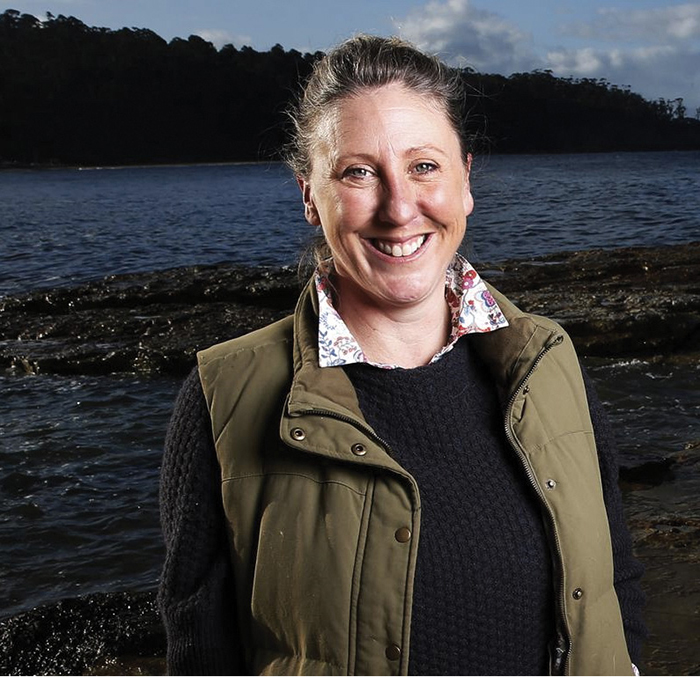
She has proven adept at pioneering ways for the aquaculture sector to reframe its identity around acknowledging and deepening a sense of stewardship of public resources, and now she is bringing that focus to recreational fishing.
For eight years she worked as Huon Aquaculture’s corporate affairs manager, where a key role was to ensure that the Tasmanian community knew about and could help shape what the company was planning.
She created trusted relationships and harnessed new technology, including the launch of a sustainability dashboard that allowed Huon Aquaculture to report on the company’s performance to the public in real time. Gallichan worked closely with stakeholders throughout Tasmania on this, about the kind of information they were interested in seeing and why that information was important to them.
This approach to providing real-time relevant information has since been adopted by aquaculture companies around the world. For Gallichan, this work brought home the importance of communities developing a voice about the issues that matter to them. That insight saw her join the Tasmanian Association of Recreational Fishing (TARFish) in 2020 as CEO to empower the voices of recreational fishers.
“I believe that good decisions to support sustainable resource use come from all parties having a voice and representation that is informed by science and works to find win–win solutions wherever possible. Even if that means changing the way
things are done.”
Her approach is built on an understanding that a duty of care implicitly drives innovation and continual improvement. But it also requires communication between parties and relationship building.
Gallicahan has developed her career around these values, combining passion, purpose and skills. But she says women still face residual biases in the sector and she sees a role for seafood’s senior leadership to champion and encourage talented women.
“There is nothing lost in listening to other people, their concerns and ideas, including the experiences of women,” she says. “Being open as an organisation means that your own perspective will continue to improve. The flip side of that is that you have to be prepared to change.”
More information
Jane Gallichan jane.gallichan@tarfish.org
Huon Aquaculture’s sustainability dashboard https://dashboard.huonaqua.com.au
Tasmanian Association of Recreational Fishing (TARFish) www.tarfish.org
Cassie Price
The habitat restorer
By Gio Braidotti
Born into a recreational fishing family in South Australia, Cassie Price developed a strong affinity for the wonders of natural aquatic environments when she was very young. The desire to better understand these intriguing ecologies saw her study environmental science and then pursue a career in habitat management.
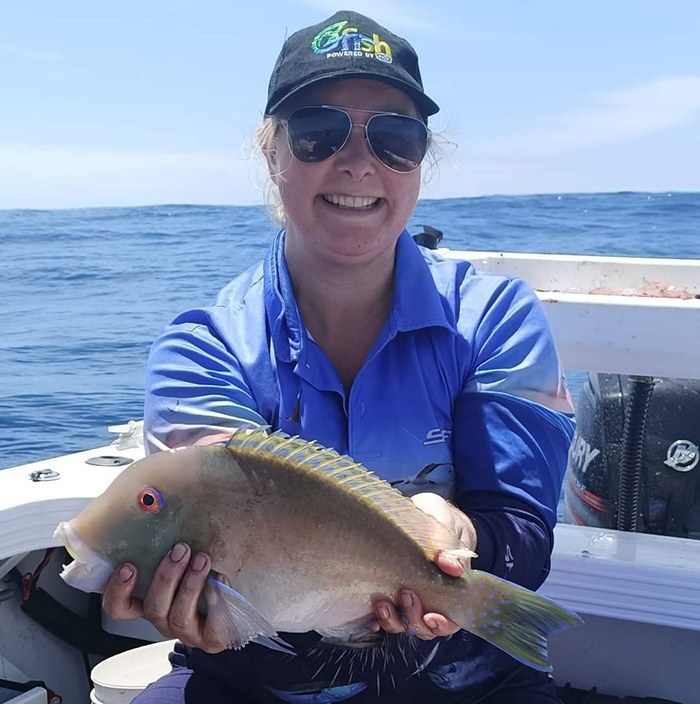
Now based near Richmond River in northern New South Wales, Price serves as director of habitat programs at the not-for-profit organisation OzFish Unlimited, where she coordinates aquatic habitat restoration projects across Australia.
“Our aim at OzFish is to provide technical expertise that enables fishers to take action for the health of aquatic systems – rivers, lakes, estuaries and reefs,” she says. “By working together, we help shore up the future of these beautiful habitats.”
Price oversees more than 70 projects in partnership with thousands of volunteer fishers and local communities across Australia.
These projects range from local efforts to clean up waterways through to complex multi-state initiatives. Examples of such projects are the Fish Emergency Recovery projects that deploy recreational fishers to help fish populations recover from the impact of bushfires, droughts and floods.
Price’s role is multifaceted and requires extensive multitasking, broad-ranging scientific expertise and exceptional communication skills. Additionally, she makes time to cultivate a rich family life, which includes introducing her young children to a fishing line and the local
marine habitats.
Despite the challenges, she says getting the balance right between her professional and private life allows her to thrive.
“It’s important that women understand they don’t have to pursue careers in a traditional way,” she says. “It’s okay to ‘operate like a woman’. That may mean a different approach to your work, or taking time out of work to start a family and creating a unique work life that suits you. That is possible, especially so if you are mindful about building networks of support in your life,” says Price.
Ultimately, her career and family life help to supercharge an innate drive to build a better future. This drive will see her stay on at OzFish, helping the organisation that first launched actionable projects in 2017 to grow and develop.
“Despite the many challenges associated with ensuring continuity of resources for OzFish projects, I want to see OzFish continue to build our movement of active recreational fishers and tap the growing national sentiments towards more sustainable management of our natural habitats,” she says. f
More information
Cassie Price info@ozfish.org.au
OzFish https://ozfish.org.au/projects
Membership 1800 431 308 or info@ozfish.org.au
Donate https://ozfish.org.au/donate





